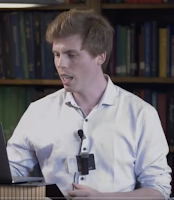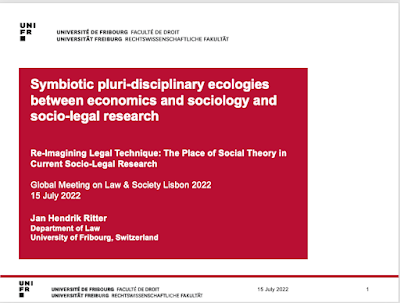Jan Henrik Ritter delivered a marvelous presentation at the recently concluded annual meeting of the Law & Society Association held this year in Lisbon, Portugal. The Panel session, Re-Imaining Legal Technique: The Place of Social Theory in Current Socio-Legal Research, explored "the place of social theory in relation to a range of settings, from climate change, gender identity, law’s ecological orientation, corporate personhood and relations between humans and machines. Questions of how law constructs subjects and objects are prominent, as well as the relationship between conceptual and empirical exploration in law."
Ritter's presentation was entitled "Symbiotic pluri-disciplinary ecologies between economics and sociology and socio-legal research" and explored the questions: Do social theories matter for law? If the answer to that question is yes, which social theories? And how can social theories be operationalized in law? The abstract elaborated:
The first question is convincingly answered in the form of a legal concept of justice as ‘ecological orientation of law’ developed by G. Teubner. He argues that in order to fulfil the promise of justice law needs to be oriented towards adequacy with its environment. This conceptualization of justice only seemingly turns law towards its environment. As the fluidity of modern society precludes a stable and adequate relationship between law and its environment Teubner’s concept of justice really refocuses law on itself and releases what Teubner calls ‘juridical creativity’ through self-transcendence.
This contribution draws on the observation that Teubner’s concept of justice would be unthinkable outside the framework of systems theory. It argues that if the fundamental legal concept of justice and social theories are closely intertwined, the questions on the just social theories for law as well as their operationalization in law are themselves reconfigured as a matter of interdisciplinarity.
The contribution examines contemporary approaches to interdisciplinarity that draw on a comparative methodology. The latter aims at using multi-disciplinary perspectives in a complementary way by integrating social theories under a common framework. It then problematizes these approaches by analyzing how these strategies risk establishing a hegemonic relation among compared social theories. Against this backdrop the contribution contrasts comparative methodologies to an approach that conceives of the relation between social theories as parasitic. This approach centers on the notion of noise inherent to any social theory and is inspired by the imaginary of ‘parasite’ (M. Serres) as subversive and disruptive force.
Ritter has been kind enough to share both his panel PowerPoint, and brief thoughts on the issues. These follow below. Both are rich sources of a critical conversation about the state of knowledge and its rationalization. It is a reminder of the ongoing transformation of the disciplines, once founded on what had been understood as solid verities. As these verities have weakened new verities, and a new ecology of knowledge must emerge. Or it need not and the structures of knowledge will ossify in endless self reference in which the new is consumed and transformed into the old, and the old becomes more and more detached from the present, and disconnected from the future. It is in this formative stage of change--and choice--the choice to stand still in the present, wander back into the embrace of the past, or embrace what is emerging, will be made. See also Ritter's excellent lecture, Normativity Reconsidered - From Laws of Form to the Form of Law — Jan Hendrik Ritter (28 October 2019). .
Inspiration, Revaluation, Revolution: Symbiotic pluri-disciplinary ecologies between economics, sociology and socio-legal research
I was delighted to participate in the panel ‘Re-Imagining Legal Technique: The Place of Social Theory in Current Socio-Legal Research’ organized as part of the Global Meeting on Law&Society held in Lisbon from July 13-16 2022. Special thanks to Laura Mai (Tilburg University) for making this possible and Klaas Eller (University of Amsteram) for offering valuable feedback in his role of discussant. The panel provided a stimulating opportunity to present my latest research on ‘Symbiotic pluri-disciplinary ecologies between economics, sociology and socio-legal research’.
Pluralist research approaches are omnipresent in jurisprudence to the point that the very boundaries arise out of cooperation rather confrontation between different disciplines interested in law. To be sure, legal research is at an inflection point. The acknowledgement of different forms of normativity beyond the nation state or the turn towards novel arrangements of economic organization interlacing juridical personhood and contract are all embedded in pluri-disciplinarity. Contrary to what both its proliferation and importance would suggest, the modalities and conditionalities of pluralist approaches remain heterogeneous and ill-defined. This creates the risk that under the guise of pluralist approaches a hegemonic relationship between disciplines prevails.
Against this backdrop the methodological framework I presented is inspired by ecology, ie, the study of interactions between organisms and environment. The methodology’s cornerstone is the identification of ‘immanent disturbances’ (Stäheli) within a given scientific discourse. These open opportunities for creative trans-position between different theoretical frameworks. My remarks can be summarized around three keywords: inspiration, revaluation, reincarnation.
Inspiration. From a semantic perspective established pluri-disciplinary approaches emerge in a rich linguistic landscape of ‘interact[ing]’ disciplines (Grundmann, Micklitz, Renner), the arising ‘network of disciplines’ (Eller) or the creation of ‘bridge-building modalities’ (Knöpfel) between social sciences. Supplementing these social, technological or architectonical semantics and imaginaries the methodological framework I formulate the hypothesis that the development of a pluri-disciplinary research methodology must seek inspiration from biology, specifically ecology. In its biological context, the term ecology refers to ‘the scientific study of the interactions between organisms and the environment’. Part of this field is the study of interactions between species. According to their ‘effects on the survival and reproduction’ these interactions can be categorized in competition that ‘negatively affects both organisms involved’, exploitation that ‘benefits one organism while harming the other’ and positive interactions who ‘benefit one or both organisms without harming either’. As subcategory of positive interactions, the vectors of a symbiotic relationship are the mutual benefits for the involved species. Put differently, the language of cost and benefit is central to the description of these forms of community ecologies in biology.
Revaluation. In order to effectively unlock the biological concept for the question of the modalities and conditionalities of pluri-disciplinary methodologies at hand, the cost and benefit imaginary is insufficient. It has to be supplemented with the intellectual gesture of ‘revaluation of values’ as coined by Friedrich Nietzsche. Nietzsche states
‘Whatever has value in the present world has it not in itself, according to its nature – nature is always value-less – but has rather been given, granted value.’
Out of a variety of different significations that ‘revaluation of values’ holds in Nietzsche’s thinking the term is best understood as the conception of alternatives where such alternatives had been inconceivable. More specifically, Nietzsche’s gesture is transposed here as a pluri-disciplinary methodology that breaks out of a discipline’s theoretical framework by uncovering ‘immanent disturbances’ whose creative potential can be harnessed by connecting the established concepts within a supplementary theoretical framework thereby creating a symbiotic pluri-disciplinary ecology.
Reincarnation. The acknowledgment of the possibility of pluri-disciplinary ecologies destabilizes the premise of disciplinarity itself. In this respect, the imaginary of ecology parts ways with the language of cost and benefit used in biology. Rather than focusing on the exchange between fixed disciplinary identities, if considered in their ecologies the relation between disciplines is what defines their very identity rather than the other way around giving a fresh embodiment for each discipline – a ‘revaluation’ in its own way.
I am grateful to Larry Catá Backer for the opportunity to present my research. Slides below janhendrik.ritter@unifr.ch
Inspiration, Revaluation, Revolution: Symbiotic pluri-disciplinary ecologies between economics, sociology and socio-legal research
Jan Hendrik Ritter
I was delighted to participate in the panel ‘Re-Imagining Legal Technique: The Place of Social Theory in Current Socio-Legal Research’ organized as part of the Global Meeting on Law&Society held in Lisbon from July 13-16 2022. Special thanks to Laura Mai (Tilburg University) for making this possible and Klaas Eller (University of Amsteram) for offering valuable feedback in his role of discussant. The panel provided a stimulating opportunity to present my latest research on ‘Symbiotic pluri-disciplinary ecologies between economics, sociology and socio-legal research’.
Pluralist research approaches are omnipresent in jurisprudence to the point that the very boundaries arise out of cooperation rather confrontation between different disciplines interested in law. To be sure, legal research is at an inflection point. The acknowledgement of different forms of normativity beyond the nation state or the turn towards novel arrangements of economic organization interlacing juridical personhood and contract are all embedded in pluri-disciplinarity. Contrary to what both its proliferation and importance would suggest, the modalities and conditionalities of pluralist approaches remain heterogeneous and ill-defined. This creates the risk that under the guise of pluralist approaches a hegemonic relationship between disciplines prevails.
Against this backdrop the methodological framework I presented is inspired by ecology, ie, the study of interactions between organisms and environment. The methodology’s cornerstone is the identification of ‘immanent disturbances’ (Stäheli) within a given scientific discourse. These open opportunities for creative trans-position between different theoretical frameworks. My remarks can be summarized around three keywords: inspiration, revaluation, reincarnation.
Inspiration. From a semantic perspective established pluri-disciplinary approaches emerge in a rich linguistic landscape of ‘interact[ing]’ disciplines (Grundmann, Micklitz, Renner), the arising ‘network of disciplines’ (Eller) or the creation of ‘bridge-building modalities’ (Knöpfel) between social sciences. Supplementing these social, technological or architectonical semantics and imaginaries the methodological framework I formulate the hypothesis that the development of a pluri-disciplinary research methodology must seek inspiration from biology, specifically ecology. In its biological context, the term ecology refers to ‘the scientific study of the interactions between organisms and the environment’. Part of this field is the study of interactions between species. According to their ‘effects on the survival and reproduction’ these interactions can be categorized in competition that ‘negatively affects both organisms involved’, exploitation that ‘benefits one organism while harming the other’ and positive interactions who ‘benefit one or both organisms without harming either’. As subcategory of positive interactions, the vectors of a symbiotic relationship are the mutual benefits for the involved species. Put differently, the language of cost and benefit is central to the description of these forms of community ecologies in biology.
Revaluation. In order to effectively unlock the biological concept for the question of the modalities and conditionalities of pluri-disciplinary methodologies at hand, the cost and benefit imaginary is insufficient. It has to be supplemented with the intellectual gesture of ‘revaluation of values’ as coined by Friedrich Nietzsche. Nietzsche states
‘Whatever has value in the present world has it not in itself, according to its nature – nature is always value-less – but has rather been given, granted value.’
Out of a variety of different significations that ‘revaluation of values’ holds in Nietzsche’s thinking the term is best understood as the conception of alternatives where such alternatives had been inconceivable. More specifically, Nietzsche’s gesture is transposed here as a pluri-disciplinary methodology that breaks out of a discipline’s theoretical framework by uncovering ‘immanent disturbances’ whose creative potential can be harnessed by connecting the established concepts within a supplementary theoretical framework thereby creating a symbiotic pluri-disciplinary ecology.
Reincarnation. The acknowledgment of the possibility of pluri-disciplinary ecologies destabilizes the premise of disciplinarity itself. In this respect, the imaginary of ecology parts ways with the language of cost and benefit used in biology. Rather than focusing on the exchange between fixed disciplinary identities, if considered in their ecologies the relation between disciplines is what defines their very identity rather than the other way around giving a fresh embodiment for each discipline – a ‘revaluation’ in its own way.
I am grateful to Larry Catá Backer for the opportunity to present my research. Slides below janhendrik.ritter@unifr.ch














No comments:
Post a Comment